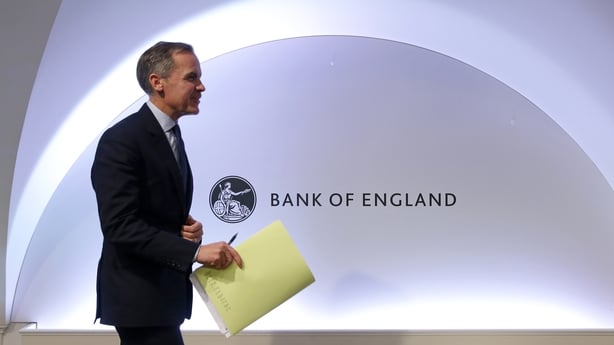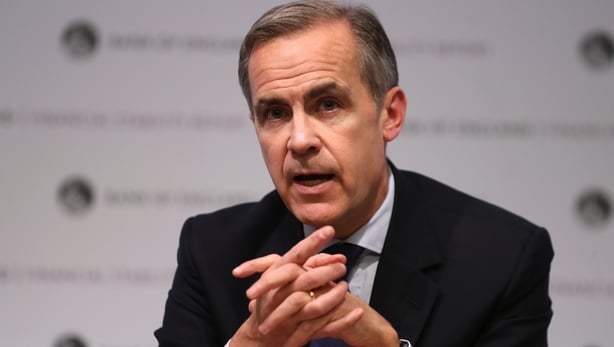A hard Brexit will lead to a disruptive environment for British businesses, the Central Bank Governor has warned.
The Central Bank chief also said that the uncertainty surrounding the transition deal and final outcome of Brexit has had a "chilling effect" on investment in the UK.
Central Bank Governor Philip Lane said backing the draft withdrawal agreement would provide guidance to firms.
Speaking to the Institute of Bankers in Dublin today, Mr Lane laid bare the impact of a no-deal Brexit.
"In one direction, the ratification of the withdrawal agreement would provide some guidance to firms as to the general trajectory of the future UK-EU27 relationship, even if much will remain uncertain until the negotiations about the post-transition environment are concluded," he said.
"It follows that the passing of the withdrawal agreement could unlock business investment in the UK through a reduction in uncertainty," he added.
"In the other direction, a hard Brexit would constitute a much more disruptive environment, in view of the lack of clarity about the future UK-EU27 relationship under a hard Brexit and the absence of a road map as to how this future relationship will be negotiated," Mr Lane said.
"Furthermore, while the common travel area between Ireland and the UK will be preserved, restrictions on the free movement of people between the UK and the EU27 will disrupt the operation of labour markets, given the high levels of two-way mobility that have developed over the last 40 years," he added.
"Beyond the implications for individual citizens, restricted labour mobility will also affect the dynamics of different industries in the coming years."
He added that a productivity boost from specialised talent pools in specific locations will be "undercut" by restrictions on labour mobility.
"While some of these costs will only kick in after the transition phase concludes, forward-looking firms, households and investors have already responded in various ways since the referendum," he stated.
"One major adjustment mechanism has been the significant weakening of sterling against the euro, which constitutes a terms of trade decline for UK residents. It is also estimated that UK firms have already started to pull back from EU-orientated export strategies, in anticipation of future trade barriers," the Central Bank chief added.
Extreme Brexit could be worse than financial crisis for UK - Bank of England
Earlier, Bank of England Governor Mark Carney said it was in Britain's best interests to strike a transition deal with the European Union, regardless of whatever form Brexit takes.
"It is in the interests of the country to have some time to transition to whatever relationship there is," Carney said in a BBC radio interview,
His comments come a day after the central bank published arange of Brexit scenarios it said banks could have to deal with.
The Bank of England said yesterday that Britain risks suffering an even bigger hit to its economy than during the global financial crisis 10 years ago if it leaves the European Union in a worst-case Brexit scenario in four months' time.
Hours after the government issued its own stark warning about a no-deal Brexit, the Bank of England said the economy could shrink by as much as 8% in about a year.

The two reports could add to pressure on lawmakers to drop their opposition to the Brexit agreement that Prime Minister Theresa May struck with other EU leaders on Sunday, which is far from certain to be approved in parliament on December 11.
However, supporters of a more definitive break with Brussels quickly dismissed the reports as scaremongering.
Advocates of closer ties said the forecasts demonstrated that promises of greater prosperity outside the EU had been a lie.
The Bank of England said the "disorderly" scenario - involving severe delays at UK borders and financial markets' loss of confidence in British institutions - was not its base case.
But if it happened, there would be a 25% tumble in the value of sterling - taking it close to parity against the dollar - a spike in inflation to 6.5% from around 2.4% now, and a jump in interest rates.
House prices would fall by 30%.
Sterling gave up its earlier gains yesterday as the Bank of England outlined its various scenarios.
It said a merely "disruptive" Brexit, with goods flowing across borders but facing tariffs and other barriers, would cause a 3% fall in gross domestic product.
"Our job is not to hope for the best but to prepare for the worst," Bank of England Governor Mark Carney told a news conference, noting that Britain's banks could cope with the worst Brexit shock.
A deal that kept Britain and the EU in a close future relationship could lead to faster economic growth than the BoE pencilled in earlier this month, the bank said.
But all of the Bank of England's scenarios assumed interest rates will rise.
In the worst-case Brexit, rates could rise to 5.5% - a level last seen in 2007, before the financial crisis - from the current base rate of 0.75%.
Hours earlier, the government acknowledged that any Brexit option would be worse for the economy than staying in the EU, but said that leaving the bloc without any agreement with Brussels would weigh heavily on growth at least into the 2030s.
By contrast, the plan that May agreed with EU leaders on Sunday "delivers an outcome that is very close to the economic benefits of remaining in", finance minister Philip Hammond said.
The government and Bank of England reports triggered angry responses from hardline eurosceptics, who viewed the statements as a repeat of dire official warnings intended to sway voters before 2016's referendum.
"I'm afraid we must be ready for Project Fear 2.0," said former Brexit minister David Davis, who quit in July in protest at May's plans.
Andrew Sentance, a former Bank of England interest rate setter, challenged the bank over its worst-case scenario.
"Does anyone really believe any of this as a real-world scenario?" he said. "The Bank of England is undermining its credibility and independence by giving such prominence to these extreme scenarios and forecasts."
Mark Carney denied the charge of scaremongering.

"Parliament has demanded this analysis," he said. "It's not supposed to make people scared, it's supposed to provide reassurance that, even if this happened, which is not likely, the system is more than ready for it."
Opponents of Brexit said the projections gave the lie to promises made by Brexit campaigners before and after the referendum.
The government report said that, in a scenario based on the Brexit plan that May announced in July, rather than Sunday's amended agreement with EU leaders, national output would be 2.1% smaller in just over 15 years' time than if Britain remained in the bloc.
If there was no deal, it would be 7.7% smaller.
Assuming zero net migration from the EU in the future, the hit to the economy would be bigger - 3.9% under May's deal, and 9.3% without a deal.
The report said Britain's automotive and chemicals sectors faced the biggest potential losses from a no-deal Brexit - more than 20% of output.
Brexit supporters say May's deal will hurt Britain over the long term by making it harder to strike trade deals with faster-growing countries and regions beyond Europe, and it is not clear that lawmakers will be swayed by the latest forecasts.

